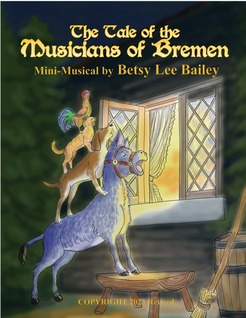Most of the houses are inhabited by empty-nesters. Many of the houses have widows or much older couples. A few also have basement apartments that are rented by newlyweds. When a neighborhood or Ward gets to that point it is sometimes called the Ward of the "Newly-Weds and Nearly-Deads."
Eventually neighborhoods can recover and little by little get younger families who move in as houses become available. Our family moved around the country often enough that we actually witnessed the change over of several of our neighborhoods. We were usually one of the younger families with kids that brought a shot of vitality to a "nearly-dead" situation.
Now I am part of the "widowed empty-nester" group. I like to think I do my part, though. I have had some of my grandchildren living with me. So technically, I haven't had a totally empty nest.

As she journeyed toward Bremen, she convinced some of the other animals to join her. The donkey, the dog, the cat and the rooster each thought they had beautiful singing voices. So they decided to earn their way by singing in the very musical town of Bremen. Fortunately for the town of Bremen, the animals found a situation where they could happily stay and sing to their hearts content --- without annoying anybody.
Facing CHANGE and DEATH are two themes that can be difficult for anyone to face, but especially for children. This ancient story is a useful tool to use to talk about those themes with young children. Besides, the songs are a delight to sing.
 RSS Feed
RSS Feed